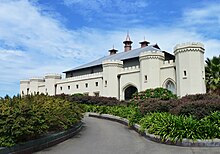George De Cairos Rego (1858–1946) was an Australian composer of light classical music.[1] He was appointed to the inaugural staff of the Sydney Conservatorium of Music. He was born in Victoria but lived mostly in New South Wales.
George De Cairos Rego | |
|---|---|
 Sydney Conservatorium where George De Cairos Rego taught music | |
| Background information | |
| Born | January 1, 1858 Melbourne, Colony of Victoria |
| Died | November 29, 1946 (aged 80) |
| Occupation(s) | Composer, conductor, teacher |
| Years active | 1880–1915 |
De Cairos Rego wrote regular columns entitled 'Realm of Music' [2] and 'World of music'[3] for The Daily Telegraph (Sydney).[4][5]
De Cairos Rego was well known as an organizer in musical circles,[6] as a founder of the Musical Association of New South Wales in which he acted as secretary for his active years. He was also active in the Australian National Council of Music Associations.[7]
His children Rex and Iris[8] were also professional musicians. Iris[9] became known as a pianist and composer in her own right.
A patent was issued in Britain and the United States Patent and Trademark Office for his invention of an electromagnetic vibrator,[10] possibly to assist violinists with vibrato fingering. He also published research on the conversion of electricity into audible vibration and vice versa.
In 1902 he made a tour of the United States of America.[11] De Cairos Rego survived his wife, Lilian Ada by more than ten years.[12] Possibly this inspired his interest in Theosophy.
Critical reception
editA Commonwealth hymn,[13] written for a national celebration of New Year's Eve, at federation of the Australian states, did not proceed as a choir performance, despite his considerable influence.[14] He received a Licentiate in music from Trinity College London.[15]
Works
editRecordings
editThis section is empty. You can help by adding to it. (April 2020) |
References
edit- ^ Skinner, Graeme (2011). "de Cairos-Rego, George". Dictionary of Sydney. Dictionary of Sydney Trust.
- ^ "Realm of Music". The Daily Telegraph. Sydney. 26 June 1926. p. 17. Retrieved 2 April 2020 – via Trove.
- ^ "The World of Music". The Daily Telegraph. Sydney. 7 May 1927. p. 41. Retrieved 2 April 2020 – via Trove.
- ^ "Stage and Music World". The Daily Telegraph. Sydney. 21 January 1922. p. 8. Retrieved 2 April 2020 – via Trove.
- ^ "Music". The Daily Telegraph. Sydney. 24 September 1921. p. 8. Retrieved 2 April 2020 – via Trove.
- ^ ""Conference of Music Teachers"". Sydney Mail. New South Wales, Australia. 13 March 1929. p. 24. Retrieved 2 April 2020 – via Trove.
- ^ "Late Mr. George de Cairos-Rego". The Sydney Morning Herald. 13 June 1946. p. 4. Retrieved 2 April 2020 – via Trove.
- ^ "Death of Mr. G. de Cairos-Rego". The Sydney Morning Herald. 12 June 1946. p. 5. Retrieved 2 April 2020 – via Trove.
- ^ "Iris de Cairos-Rego". Retrieved 3 April 2021.
- ^ "A New Vibrator". The World's News. New South Wales, Australia. 20 February 1926. p. 14. Retrieved 2 April 2020 – via Trove.
- ^ "Music". The Critic. Adelaide. 20 September 1902. p. 11. Retrieved 3 April 2020 – via Trove.
- ^ "Advertising". The Sydney Morning Herald. 1 August 1932. p. 2. Retrieved 3 April 2020 – via Trove.
- ^ De Cairos-Rego, G. (George); Farrell, John (1900), Official hymn of the Commonwealth [music] : to be sung at the Inauguration Ceremony, January 1, 1901
- ^ "The Celebrations". Evening News. New South Wales, Australia. 29 December 1900. p. 6. Retrieved 2 April 2020 – via Trove.
- ^ "Music". Sunday Times. New South Wales, Australia. 27 March 1921. p. 18. Retrieved 3 April 2020 – via Trove.
- ^ De Cairos-Rego, G. (George), Melba valse [music] / G. de Cairos Rego (in no linguistic content), Nicholson & Co
- ^ "New Music". The Sydney Morning Herald. 20 August 1890. p. 3. Retrieved 3 April 2020 – via Trove.
- Photograph of De Cairos Rego in 1930 [1]
- Music Scores on International Music Score Library Project by Scores of George de Cairos Rego
- ^ "Distinguished Musician Welcomed". The Sydney Morning Herald. 23 July 1930. p. 16. Retrieved 2 April 2020 – via Trove.